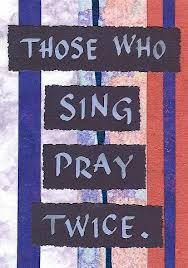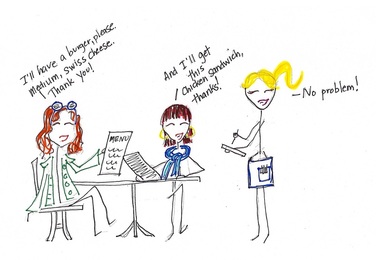 Hanging to my left on the wall in my office is this card: "Those Who Sing Pray Twice." Like most of what I am surrounded by (G!d forbid this should ever include the loved ones in my life), I take little day to day notice of. But I couldn't help gain some new insight into what this quote may mean in the light of this week's Torah portion, Parshat Chukat. The most famous instance that we find B'nai Yisrael breaking into spontaneous song is after its perilous flight from Egypt and its subsequent crossing of the sea. The Song of the Sea begins: אָז יָשִׁיר-מֹשֶׁה וּבְנֵי יִשְׂרָאֵל אֶת-הַשִּׁירָה הַזֹּאת (Exodus 15:1) Then sang Moshe, and all the Israelites with him, this song... So too in Pasrhat Chukat do we find Israel breaking into song after another act of Divine salvation, this time from the hands of the Amalekites (disguised, according to Rashi, as Cannanites):אָז יָשִׁיר יִשְׂרָאֵל, אֶת-הַשִּׁירָה הַזֹּאת (Numbers 21:17) Then did Israel sing this song....(doo-daa, doo-da) What is the connection? A line from Psalms gave me a clue: לַיהוָה הַיְשׁוּעָה עַל-עַמְּךָ בִרְכָתֶךָ סֶּלָה. (Psalms 3:9) Rescue is the Lord's! On Your people your blessing (Alter translation) The midrash on this psalm helped me understand somethng new. Midrash Tehillim unpacks this line to mean “for all the miracles you do for us it is our obligation to sing songs for you” According to the midrash then, a blessing = a song. As the card says: "Those Who Sing Pray Twice." In a more modern context, from where does spontaneous song arise? In a beautiful interview, Roseanne Cash, the daughter of the legendary musician and songwriter Johnny Cash, comments on her music writing process: "I think that when you're in that creative zone, you're tapping into the collective unconscious, and that there's a field there. I think that's the unified field, that creative vast unconsciousness full of beauty and love. And when you're in the zone, as a writer, as a painter, as a cook--any creative endeavor--you can draw on it. Sometimes I feel like the songs are already out there... It's not that way with all of them...(but) some of them are infused with the radiance of truth, and those are the ones that I think come from that unified field, from God, from what I think of as God. That doesn't mean I'm extra special, by the way. That means everyone has access to it." Collective unconscious, unified field, שמע ישראל. B'nai Yisrael breaks into song after rescue because it is for them, as it is for me, a moment in which my senses are in a heightened state of awareness. I'm more tuned in, and channel provides better reception. I'm in the zone. May we all be blessed to sing our song, whether it rise up in times of plenty or in times of trouble. And may our songs be drawn from the Infinite well, a song that in turn draws us back to our source. "Those Who Sing Pray Twice."
7 Comments
 Tell me if you've heard this one before? Four guys are standing on a street corner...an American, a Russian, a Chinese man, and an Israeli... A news reporter comes up to the group and says to them: "Excuse me...What's your opinion on the meat shortage?" The American says: What's a shortage? The Russian says: What's meat? The Chinese man says: What's an opinion? The Israeli says: What's "Excuse me"?..... If you have ever been to Israel you probably really "grok" that joke. In Israel being offered a "slicha" is often followed by being pushed and shoved on the bus. Israelis live in one of the toughest neighborhoods in the world, so we might excuse them for being a little pushy. This joke came up in a discussion about the use of language, following an incident similar to the cartoon I posted. My wife, my daughter and I were with friends at a very lovely Indian restaurant. The waitress refilled my water glass. I said "thank you", to which she replied "No problem." Is it just me that finds this irksome? I like when people say "you're welcome" in response to my "thank you". I know I know, it's a generational thing, and besides, it's her job, so it really IS no problem because that's what she is supposed to be doing. There was disagreement around our dinner table, and not just from my 17 year old. As I see it, everything has become so casual - dress, conversation, behavior - resulting in the disappearance of common courtesy. When our daughter was born, my wife Renée and I decided that we'd have her refer to our friends with appropriate titles, such as Aunt Julia (not a real Aunt, just a friend) or Mr. Dov. We had neighbors that had their kids behave as such and we really liked it. But our friends were unwilling to go along, and after a while we gave up and our daughter started calling our friends by their first names. Imagine if I'd done that when I was a kid? I would have gotten such a zetz I wouldn't have known what hit me. Maybe I'm just getting old, and perhaps the language I grew up with and still prefer is simply out of date. Emily Post's great-grandaughter Cindy Senning writes the following: "The principles of respect, consideration and honesty are universal and timeless, but "manners change over time and from culture to culture." I take this to mean that the language through which our manners are articulated are subject to change, but that the priciples are universal. In Hebrew those principles are called "derech eretz". I am curious what you think about this. Do you long as I do for the days of "please' and "thank you"? If you have a comment please post it on the website at http://www.rebmarko.com/blog.html because it makes it easier to have a conversation rather than writing to me on the FB page. And if you liked this blog post.....ein b'aya. No probem. |
Mark Novak is a "free-range" rabbi who lives in Washington DC and works, well, just about everywhere. In 2012 he founded Minyan Oneg Shabbat, home to MOSH (Minyan Oneg Shabbat), MindfulMOSH (Jewish mindfulness gathering), and Archives
June 2017
Categories
All
|
 RSS Feed
RSS Feed
